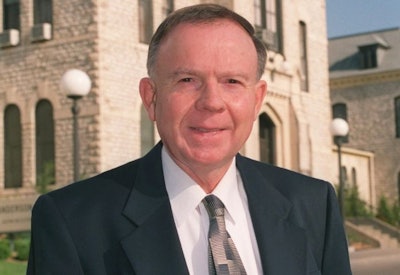
Dr. Jon Wefald was the type of man that any university should have wanted to have as a leader, but this is especially true of land-grant universities wanting to become leaders in the greater agriculture industry.
And Wefald just so happened to have been the president of the university from which I graduated: Kansas State University, commonly known as K-State.
Wefald, who has at the helm at K-State from 1986 to 2009, died on April 16 at the age of 84.
People are paying tribute to the man, through the mainstream media and through social media, but in most cases, he is being praised for his role in increasing enrollment and improving the athletic programs at the university. While both are true and significant accomplishments, not as much is being mentioned about his commitment to improving the university’s already strong stature as a leader in agriculture research and education.
Luckily, the university put that information near the top of the press release it issued concerning Wefald’s passing.
Included in that press release was the fact that under Wefald’s leadership, research funding grew from $18 million annually to nearly $134 million.
And key to that research was agricultural research. Perhaps most notably, it was research in the areas of agro-defense and biosecurity that solidified the university’s spot on the map.
The press release stated: “In 1999, Wefald and several university and legislative leaders wrote “Homeland Defense Food Safety, Security and Emergency Preparedness Program” — also known as “The Big Purple Book.” The book outlined the university’s infectious disease research programs and established K-State as a biodefense and agro-defense leader. This reputation, built under the direction of Wefald, was also critical in the U.S. Department of Homeland Security’s 2009 decision to name Manhattan as the home of the National Bio- and Agro-Defense Facility, or NBAF. Wefald’s efforts for the construction of the Biosecurity Research Institute on the Manhattan campus played an integral part in landing NBAF.”
The Minnesota connection
Wefald passed away in Minnesota, the state where he was born and also spent much of the earlier part of his career.
That includes leadership in the agriculture industry.
From 1971 to 1977, he served as Minnesota's Commissioner of Agriculture, and guest lectured. In 1977, he became president of Southwest State University in Marshall. Then, in 1982, he became a Chancellor of the six state university system of Minnesota before heading to Kansas.
A friend of the farmer
At the time I was a student at K-State, I’ll admit, I was just a young punk from the country who didn’t realize how good of a leader he was. At the time, he was just the top dude in the suit who had a nice house on campus and an office in Anderson Hall.
But I do remember the first interaction I had with him was a positive one. I was a staff member of the student newspaper, and when one of the college deans abruptly resigned, I was the one chosen to chase the story. I roamed into his office to find out what was going on, and Dr. Wefald was very respectful to me.
But about 10 years later, he spoke at the annual meeting of a county Farm Bureau association, and that experience is just as positive in my mind. The county Farm Bureau president introduced us while we were going through the buffet line. We had a nice visit. I know he didn’t remember me, but he still showed a kind concern for me as a person and was appreciative of the fact that I found the Farm Bureau meeting and his appearance there worthy of my time and attention.
And it was. Here are some of the things he had to say while delivering his speech:
- “Let me just say that I think most of us at Kansas State University understand that even though we're in the 21st century, in the year 2002, American agriculture itself is still the greatest industry in the land," Wefald said. 'If we stop to consider that our farmers and ranchers feed America better than any country on the face of the earth, bar none, then you would think that the press, the media and the citizens of America would be more appreciative.”
- “The values and institutions that have made America the greatest country on the face of the earth are derived from the land, and we should never ever lose sight of that.”
- “If farmers and ranchers in America were making the kind of income they deserve, we would just be so prosperous. … I just want to thank each and every one of you for your major contribution to our entire civilization and our country, and to the American economy in 2002 and in the future.”
And he was also well aware of what the faculty and staff at K-State were doing to help more effectively feed the world.
"We have 300 research scientists who are getting involved in everything from coming up with new wheat hybrid varieties to better processing techniques for our beef. About 70 percent of the wheat that was harvested over the past several years came from K-State … We are the depository of wheat seeds from all over the world,” he said.
Thank you, Dr. Wefald, for all you did for Kansas, Minnesota and the world.


















